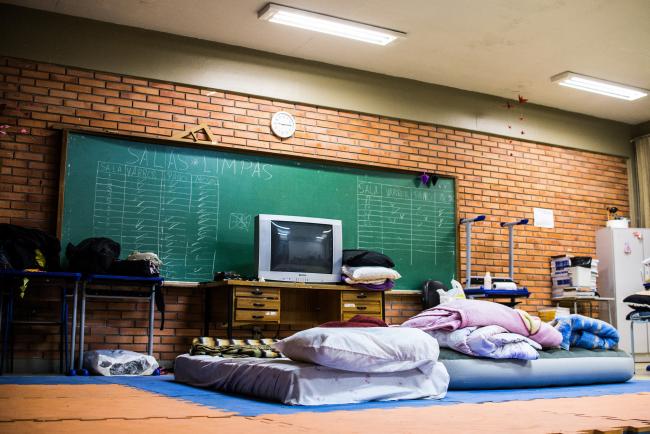
Ana Júlia, a high school student in Curitiba, Brazil, might be considered the name and the face of hope in Brazil today. On October 26, the 16-year-old gave a poignant speech in front of members of the Paraná State Assembly, in which she defended the occupation of the Colégio Estadual Senador Manoel Guimarães, a local high school in the state’s capital city. Ana Júlia’s strong defense of public education has since gone viral, and she has quickly come to represent a last stand against the public expenditure cuts being proposed by the new Brazilian government that replaced ousted president Dilma Rousseff.
Occupations of public high schools and universities have become one of the main forms of resistance to the new conservative administration of Michel Temer, which, since the conclusion of Rousseff’s highly controversial impeachment proceedings on August 31, serves as the official government of Brazil. Today, more than 1,000 schools have been taken over by students in a movement that started in São Paulo but which, over the last month, has spread to different parts of the country. When asked about the motivations for the takeovers, Ana Júlia and her peers have consistently stated that their principal desire is for a better-funded public educational systemone that is focused on preparing them for a future in a country increasingly mired in economic crisis and rising political polarization.
Though many in Brazil’s mainstream media have criticized the occupiers as somehow being manipulated by leftist political organizations, student demonstrators across various occupations have consistently denied any party affiliation, emphasizing instead their independent political stance and their demand for a basic social right to a decent education. In Ana Júlia´s words, “Our only position is in favor of education. Ours is a non-partisan movement, by students and for students.”
In response to the protests, the Brazilian Ministry of Education, which controls the bulk of higher education institutions, has been quick to demand the names of students occupying different facilities across the country. Ministry officials have also promised to retaliate against those leading the occupations, as well as administrators who do not comply with the set requirement for listing and turning in the names of protesting students.
Brazil has never had an effective educational structure. Even when investments have been made into the system, more commonly than not such funding has been siphoned into the country’s federal and state universities, from which the children of the national and regional elites have traditionally graduated. While the last 20 years have shown some promising signs in terms of higher enrollments in elementary schools and accessibility to schooling for students from non-elite and middle-class backgrounds, most of this progress can be attributed to only slightly higher levels of investment and the creation of new standards. In other words, much more profound reforms remain to be pursued. Unfortunately, should the Brazilian Senate approve the Temer government’s controversial PEC 241 constitutional amendment, the expansion for budget expenditures for the next 20 years would be prohibited, and Ana Julia and her peers’ demands for better education will probably have to wait another generation. The amendment has already been approved by Brazil’s Chamber of Deputies.
Temer’s government argues that the PEC 241 amendment is necessary given the current fiscal crisis afflicting the country. Though the budgetary difficulties are undeniably real

